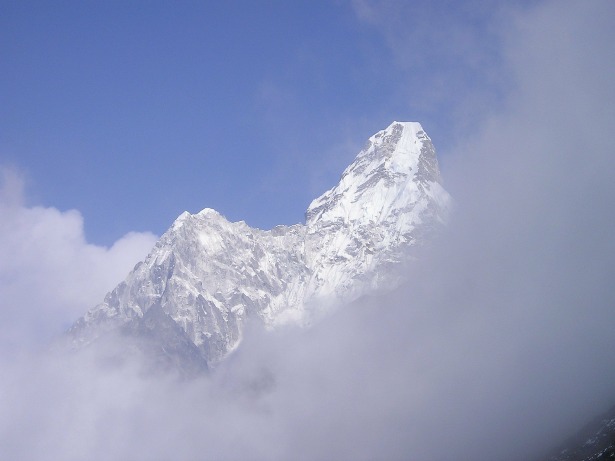
Photo: Simon on Pixabay
He grew up in the shadow of Sagarmatha, where people’s moods shifted with Miyolangsangma’s and with the weather on the mountain foreigners insisted on calling “Everest.”
“Sagarmatha is her palace,” Dādā warned. “The uninvited should not trespass into the realm of the Goddess of Inexhaustible Giving. She turns many back. Some die.”
Most in the village agreed, and still they sent men to guide foreigners to the summit. Faith did not pay for necessities, while the visitors, eager if unequipped for the altitude and Miyolangsangma’s moods, paid well. Surely the Goddess understood.
“Foreigners are ignorant,” the old man argued. “But you know better than to show irreverence.”
He did know better. But Dādā needed medicine.
“I’ll stop by Rongbuk Monastery,” Garvesh proffered on the eve of his first ascent. “I will get the monks’ blessing.”
“It will not stop Karma,” his grandfather sighed. “Or what may be our last goodbye.”
∞ ∞ ∞
Trivia and Glossary:
- Dādā — Grandfather in Nepali.
- Sagarmatha — The Nepali name for Mount Everest. The Sherpa people believe that the mountain and its flanks are imbued with spiritual energy, and one should show reverence when passing through this sacred landscape, where the karmic effects of one’s actions are magnified.
- Miyolangsangma — The “Goddess of Inexhaustible Giving” is a Tibetan Buddhist Goddess who Sherpa Buddhist Monks believe had lived at the top of the mountain.
- Rongbuk Monastery — Also called the “sacred threshold to the mountain” is an important pilgrimage site for Sherpas who live on the slopes of Everest in the Khumbu region of Nepal.
- Sherpa — One of the major ethnic groups native to the most mountainous regions of Nepal (as well as certain areas of China, Bhutan, India, and the Himalayas). The term sherpa or sherwa derives from the Sherpa language words Shar (“east”) and Wa (“people”), which refer to their geographical origin in Tibet.
For What Pegman Saw: Mount Everest, Nepal


There are so many layers of emotion to this story – it’s lovely! I hope Garvesh is able to make the expedition in a reverent manner, and that he returns safely.
LikeLiked by 1 person
Thank you, Penny. I hope so, too.
The whole reality of people climbing Everest (and other sacred mountains …) is complicated. As are the choices locals often need to make (or are faced with), with regards to how to react to such realities.
I hope he returns safely. I hope his grandfather does well and is helped by the medicine. I hope the climbers all return home safely and I hope all climbers treat the mountain (and the people who live in its shadow) with respect. Great comment! Na’ama
LikeLike
🙂
LikeLiked by 1 person
The nice informative sentences at the end of your lovely story,is excellent. Thank you. 😊
LikeLiked by 1 person
Yay, John! Thank you for this lovely comment! I’m so glad that the trivia-like information at the end helps. I always like learning a bit more about the background of stories, and so I sometimes add some information, in case others might appreciate it, too. So glad you had! 🙂
Na’ama
LikeLike
So much nuance–both in emotion and in the complex situation you’ve captured. Wonderfully written as always Na’ama.
LikeLiked by 1 person
Thank you, Karen! 🙂
You are so kind!
And complex it is, isn’t it? So often the tension between culture, exploitation, and opportunity is rife with complexity and potential for both understanding and irreverence.
Na’ama
LikeLiked by 1 person
So beautifully done, Na’ama. One must show respect for such hallowed places – even when bills are needing payment.
LikeLiked by 1 person
Thank you, Dale.
I think often times there is a tension between exploitation and opportunity, progress and respect, culture and accommodating foreigners. It’s not an easy place to be, I’m sure!
Na’ama
LikeLiked by 1 person
So very true…
LikeLiked by 1 person
Me so love being agreed with … 😉
LikeLiked by 1 person
No doubt… 😉
LikeLiked by 1 person
😀
LikeLiked by 1 person
Interesting look at this place and its proper use, through the eyes of the natives. Very mindful of the many false steps we can make when we travel abroad.
As a Floridian (though not a native! ) I kinda get the love/hate relationship with tourists and newcomers, in a purely secular way. I like the way you put it in your response to Karen’s comment: “the tension between culture, exploitation and opportunity.” Culture always seems to get the short end of the stick!
LikeLiked by 1 person
Thank you for reading and for this perceptive comment. Yes, we can all benefit from being mindful of others’ culture and to try and respect it best we can. Tourism is a good thing and a great economic catalyst. It can also be a bulldozer … mowing down cultural traditions, disrespecting locals’ needs, and generally becoming so commercialized that places risk losing their original identity. It’s all about balance in the end, isn’t it?
Na’ama
LikeLiked by 1 person
Indeed. Hard to achieve, these days!
LikeLiked by 1 person